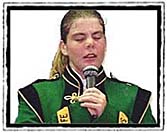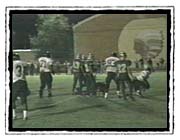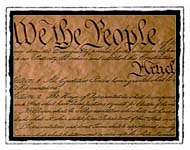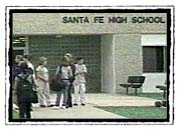|
NewsHour Links: The Supreme Court rules on public prayer before high school games The Supreme Court rules on the rights of grandparents The Kansas school system votes not to teach evolution in favor of creationism Browse the NewsHour's coverage of Law Outside
Links: The Supreme Court: From Cornell University School Prayer: a page on the Web site of a Canadian non-profit group with the goal of helping people value religious diversity.
|
School
and Religion When is it okay to pray?
The Supreme Court has ruled (6 judges to 3 judges) that students can't lead prayers over the public-address system before public school football games. The decision is the strongest statement on school prayer since the court prohibited clergy-led prayers at public school graduation ceremonies in 1992 (see the list of other Supreme Court decisions on school prayer at the end of this story). It could carry enormous significance beyond football games or other high school sports events. The First Amendment You may be surprised that this question is important enough to be considered by the Supreme Court. But the "separation of church and state" is a fundamental premise of our constitution, and of our country. After all, the Pilgrims left England to escape religious persecution in 1620 and people have been coming to America in search of religious freedom ever since. The Supreme Court said prayers broadcast before public school football games violate this constitutionally required separation of government and religion.
It'll all came down to the way the Justices interpreted the First Amendment to the Constitution.
It was the first time since 1992 that the Supreme Court, which serves to clarify, refine, and test the ideals written into the Constitution, considered a major ruling on school prayer. In 1992 the court barred clergy-led prayers at graduation ceremonies. Whose right is it? It all started about five years ago. Two families filed a lawsuit against the Santa Fe, Texas school district over the prayers.
Their lawsuit alleged that the school district's policy of allowing students to lead prayers at home football games violated the First Amendment by creating a religious atmosphere- and a lower court agreed in principle.
The school district responded to the lower court ruling by implementing strict guidelines banning pre-game prayer, and warned senior Marian Ward, elected by fellow students to deliver religious messages before football games, that she would be disciplined if she prayed. Ward's family filed suit in September, arguing that the guidelines violated her free speech rights. A U.S. District Court judge agreed that the guidelines the school had written were unconstitutional and ruled that the school could not censor Ward's speech. Decisions, decisions Voters in Texas have their own opinion about the issue. Earlier this month in the Texas Republican primary, 94 percent of voters approved a nonbinding resolution backing student-initiated prayer at school sporting events.
A majority of Americans will also be unhappy about this controversial decision-- a news poll said two-thirds of Americans thought students should be permitted to lead such prayers. Other cases dealing with religion in schools: 1940
Supreme Court rules that a public school may require students to salute
the flag and 1943
Court overturns Gobitis but is broader in its scope. No one can be
forced to salute the 1948
Court finds religious instruction in public schools a violation of
the establishment clause 1952
Court finds that release time from public school classes for religious
instruction does not 1962 Court finds school prayer unconstitutional. (Engel v. Vitale) 1963
Court finds Bible reading over school intercom unconstitutional. (Abington
School District 1963
Court finds forcing a child to participate in Bible reading and prayer
unconstitutional. 1968 Court says the state cannot ban the teaching of evolution. (Epperson v. Arkansas) 1980
Court finds posting of the Ten Commandments in schools unconstitutional.
(Stone v. 1985
Court finds state law enforcing a moment of silence in schools had
a religious purpose and 1987
Court finds state law requiring equal treatment for creationism has
a religious purpose and 1990
The court rules that the Equal Access Act does not violate the First
Amendment. Public 1992
Court finds prayer at public school graduation ceremonies violates
the establishment 1993
Court says that school districts cannot deny churches access to school
premises after-hours, if the
|

 Not
before a public school football game, according to the U.S. Supreme
Court.
Not
before a public school football game, according to the U.S. Supreme
Court. The
issue is not whether individual students can pray before the game--
they can. This case asked whether a student-led prayer could be broadcast
to everyone at a sporting event.
The
issue is not whether individual students can pray before the game--
they can. This case asked whether a student-led prayer could be broadcast
to everyone at a sporting event.  This
amendment sets out the principles regarding religion, speech, press,
assembly, and petition. Basically, it protects our right to worship
as we want, say what we want, publish what we want, gather in groups,
and make our concerns known to the government. It also prohibits the
government from identifying with a particular religion; effectively
separating church and state.
This
amendment sets out the principles regarding religion, speech, press,
assembly, and petition. Basically, it protects our right to worship
as we want, say what we want, publish what we want, gather in groups,
and make our concerns known to the government. It also prohibits the
government from identifying with a particular religion; effectively
separating church and state.  The
identities of the two families who filed the lawsuit -- one Catholic
and one Mormon -- were sealed by the courts.
The
identities of the two families who filed the lawsuit -- one Catholic
and one Mormon -- were sealed by the courts.  A
federal appeals court ruled that student-led prayers that are "nonsectarian
(not limited to one specific religion) and non-proselytizing (do not
attempt convert)" are allowed at graduations, but banned before
football games -- which the court said aren't serious enough to be
"solemnized with prayer."
A
federal appeals court ruled that student-led prayers that are "nonsectarian
(not limited to one specific religion) and non-proselytizing (do not
attempt convert)" are allowed at graduations, but banned before
football games -- which the court said aren't serious enough to be
"solemnized with prayer."  And
Texas Governor George W. Bush, who is seeking the Republican presidential
nomination, has filed a brief supporting student-led prayer.
And
Texas Governor George W. Bush, who is seeking the Republican presidential
nomination, has filed a brief supporting student-led prayer.